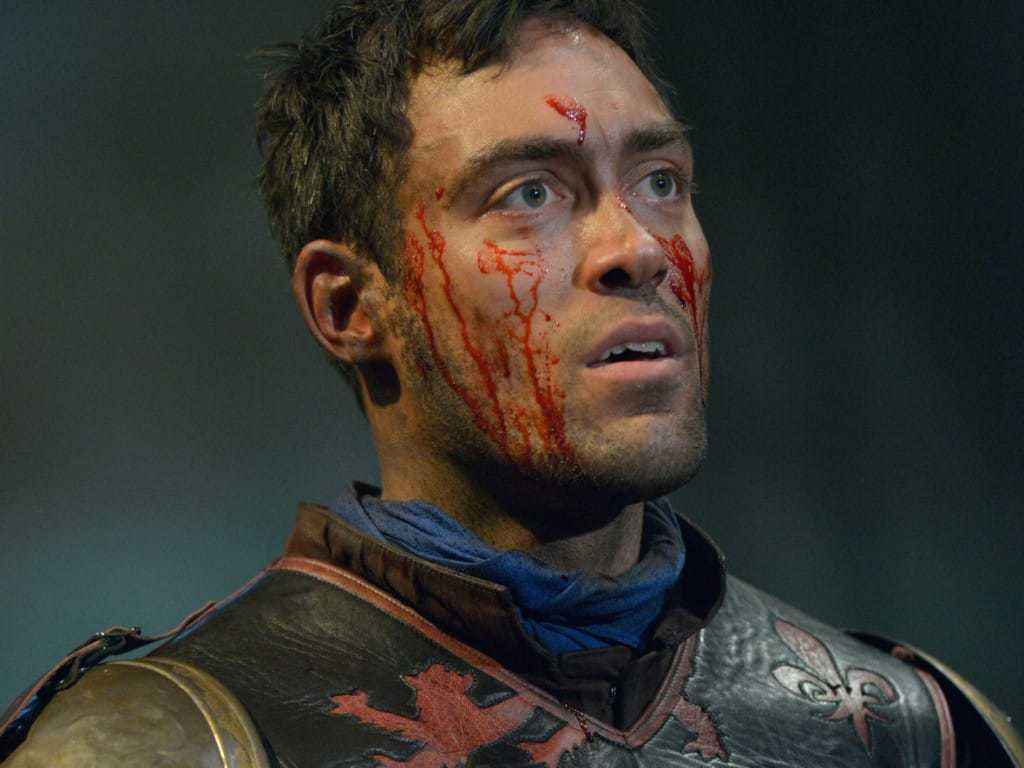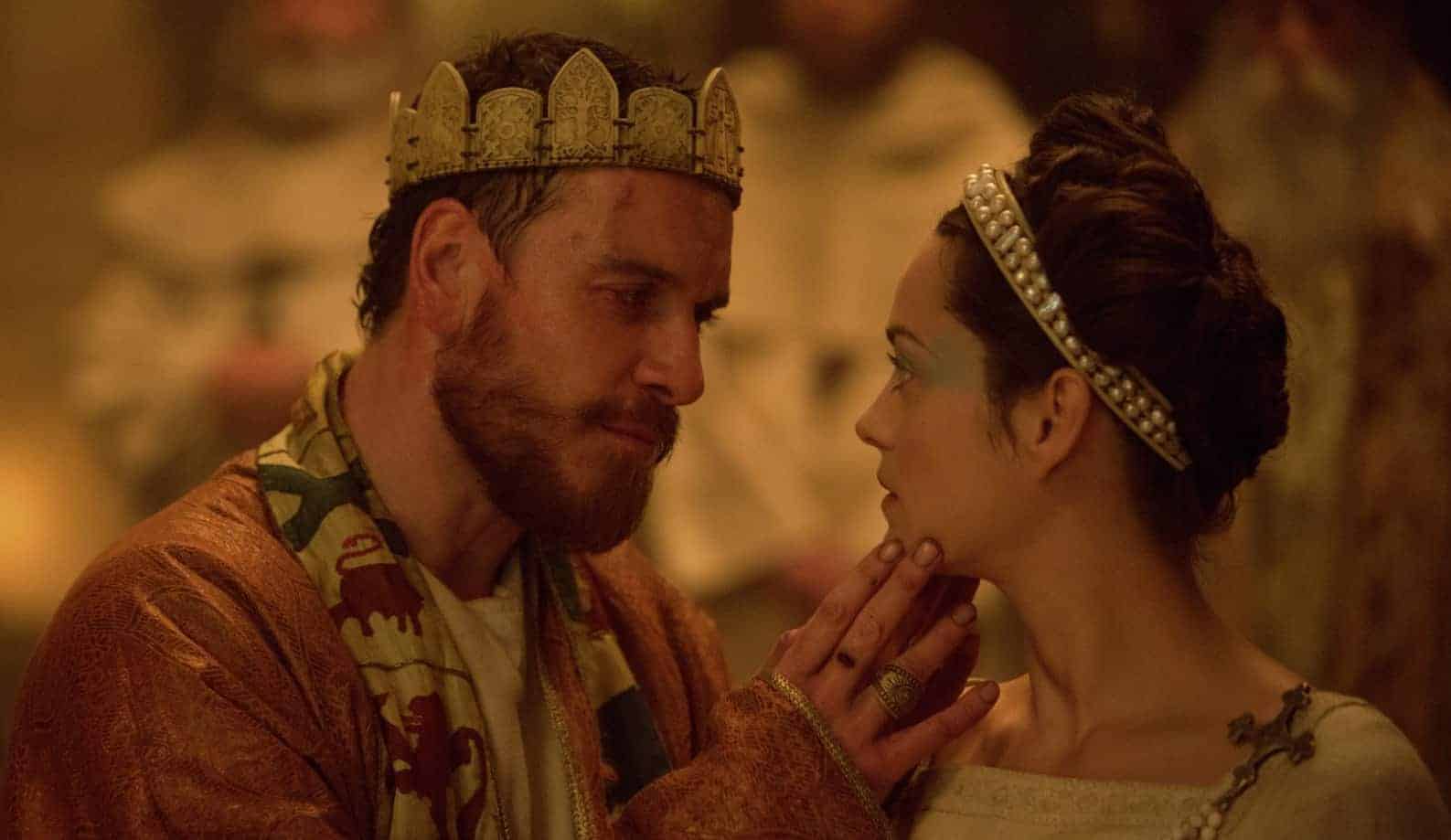The RSC’s 2015 Henry V production feels more like Henry IV Part 3. Despite being well-acted and effectively staged, Henry still acts like a prince and not a king. The production was captured live for cinema broadcasts and is now available on DVD and Blu Ray.
Read our review of the RSC’s Henry IV Part 1 and Henry IV Part 2 starring Hassell, which are also now available on DVD and Blu Ray.

Shakespeare’s Henry IV Parts 1 and 2 chronicle the growth of feckless frat boy Hal into sober ruler-in-waiting Harry. Henry V should be the culmination of that transformation: the growth of a young King into a leader. Yet the Royal Shakespeare Company’s production of Henry V feels more like Henry IV Part 3. Though this entertaining production is well-acted and effectively staged, Henry himself still acts like a prince and not a king. This may be Director Gregory Doran’s aim: showcase Harry’s (Alex Hassell) ongoing maturation by starting him off as green and unimposing. But Shakespeare’s original text establishes Henry as a man who wields authority: he is a “dread sovereign,” “terrible in constant resolution.” In the play’s text, Henry spends a lot of time talking about carnage. This ruler knows the consequences of awakening his “sleeping sword of war.”

HENRY V. Photo by Keith Pattison, courtesy of RSC.
Such lines sound strange in Alex Hassell’s jaunty voice. Hassell’s Henry is disarming and quick to laugh, relatable in a way that a more regal King might not be. But the price of boyish warmth is gravitas. No darkness runs beneath his words — no shrewdness, coiled violence, or righteous anger. Shakespeare tells us that we’ll see “the warlike Harry, like himself,/ Assume the port of Mars; and at his heels,/ Leash’d in like hounds, should famine, sword and fire/ Crouch for employment.” If such dire hounds were leash’d at Hassell’s heels, he’d probably give them a pet and a treat. Hassell lacks the aura of power that makes Henry a convincing commander.
The effect of Hassell’s sympathetic Harry is a warm and accessible production that ignores the play’s dark undercurrents. Harry’s moody soliloquies are cut down, while Fluellen (Joshua Richards) gets to speak nearly every cheerily-accented line. Doran directs moments of humour that aren’t present in Shakespeare’s text: Henry laughs in resignation at Fluellen’s long-windedness, and looks impressed rather than furious when a soldier punches him. Any deaths in the play are swift and muted.
If you want to make Henry accessible, he can’t be the man who sends his former friends to die. Perhaps this is why Doran downplays the crew of lowlifes who were once Hal’s bosom pals: they are the literal casualties of Henry’s transformation. Pistol, Bardolph, and Nym are comically ineffectual rogues, and by the end of Act I we can’t help but be fond of them. This should make their fates in Act 2 all the more shocking. Yet Bardolph’s death, often a key emotional beat, is here downgraded to a blink-and-you’ll-miss-it exchange. Their stories are among the play’s darkest elements, but they’re minimized to present Harry in a more positive light.
Unlike Lyndsey Turner’s overwrought Hamlet, Doran eschews clunky sets and lets the Chorus (Oliver Ford Davies) conjure the “vasty fields of France” with words alone. The stage is completely empty, players sometimes deliberately miss their cues, and sound design snafus abound. Doran’s frequent reminders that we’re watching a play inviting us to focus not on spectacle but on character. Our imaginations participate in creating their world, so we participate in their experiences as well.

This immersive experience is dulled by underdeveloped supporting characters, largely because Doran doesn’t give them much to do. Many of Henry’s nobles have only one or two lines in the play, which should provide rich ground for a director to use blocking to portray Henry’s relationship to his peers. But Doran’s blocking rarely conveyed much character information. Actors frequently just stood around and their movements didn’t seem purposive, giving me little insight into the mood of the court.
Henry’s nobles seem interchangeable and superfluous. When Henry reads off the names of those who died at Agincourt, I had no idea which characters they were. There are exceptions: Robert Gilbert’s preening, petulant Dauphin is a delight. Doran clearly had fun with this role, mining the Dauphin’s uselessness and flippance for comedy. As the King of France thunders, rousing his nobles to war, the Dauphin nods along eagerly while munching a plate of snacks. Hassell’s portrayal of Henry V as Man of the People works better in some scenes than in others. Henry’s speech outside the gates of Harfleur misses the mark: he’s not a regal and intimidating King, so it sounds more like exasperation than dire warning.
But in moments of vulnerability, Hassell’s youthful air pays dividends, echoing the intimacy of Hamlet’s moments of revelation. When a disguised Harry tells fearful soldiers that “Every subject’s duty is the King’s, but every subject’s soul is his own,” he isn’t instructing others on theories of kingship: he is discovering them as he speaks. We’re watching this young man figure out how to be a king.
Hassell’s finest moment is the play’s sparkling final scene between Henry and Katherine (Jennifer Kirby). Both know their marriage is a foregone conclusion, since she is Henry’s “chief demand” from France, but this Katherine won’t go quietly to her conqueror. “Me understand you well,” she spits, bluntly reminding Henry that his sweet-talk is a sham. Yet in this portrayal Henry’s admiration for Kate is utterly sincere.
Usually Katherine’s broken English is the butt of the joke, but here it’s Harry himself, who trips over his words as he’s faced with the one person who resists his charm. At one point Katherine nearly storms out, but Henry wins her back by declaring his love in French, which Hassell plays as a concession. His haplessness disarms her, and we watch as these two royals basically charm each other. It’s a rare convincing rendition of this scene, and it only works because Henry doesn’t stand on kingly dignity.
Read more: Review of RSC Henry IV Part 1 and 2 >>
Read more: Review of The Hollow Crown: Henry V >>

